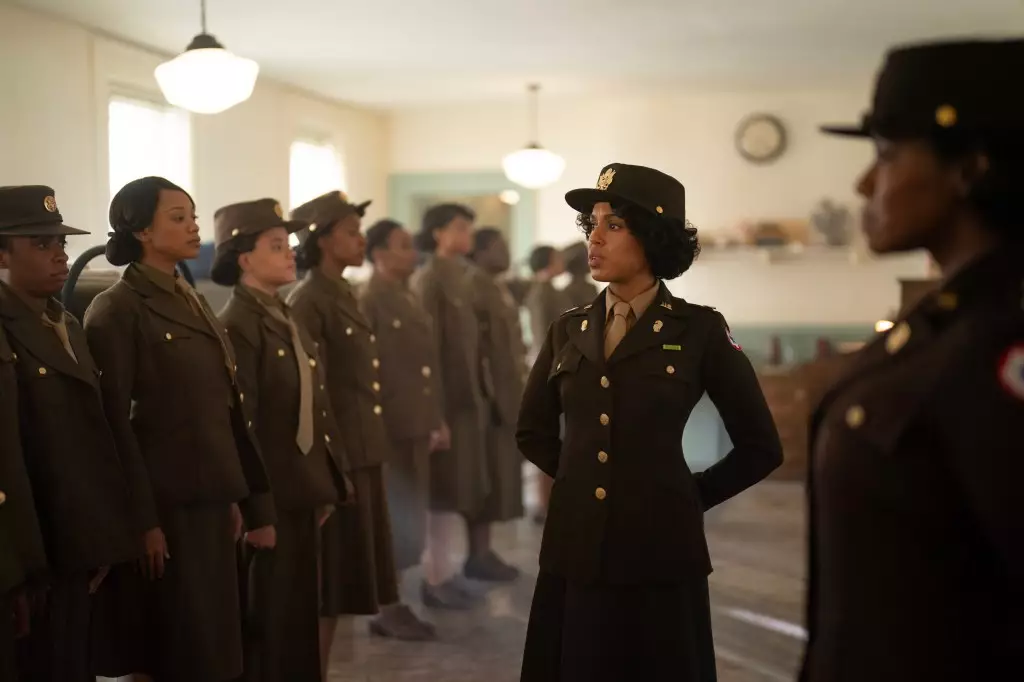In an era where the stories of the brave men and women who served in World War II are well-trodden narratives, Tyler Perry steps into the limelight with his latest film, *The Six Triple Eight*. Set against the backdrop of a war fraught with tension and heroism, this film shines a light on an often-overlooked group of individuals— the Women’s Army Corps Unit of Color—who played a pivotal role during the conflict. Scheduled for release on December 20, 2024, following a limited theatrical rollout, the film promises to bring forth a narrative that is as captivating as it is enlightening.
Drawing inspiration from Kevin M. Hymel’s article “Fighting A Two-Front War” in WWII History Magazine, Perry weaves a story of resilience, courage, and dedication, bringing to the forefront the extraordinary achievements of a unit consisting of over 855 largely Black women. These women confronted and overcame not only the environmental challenges presented by the wartime conditions but also the prevailing racism and sexism that cast a shadow over their service. Unlike their male counterparts, whose contributions have frequently been celebrated, these women remained largely unrecognized.
The primary mission of the 6888th Central Postal Directory Battalion was both simple and monumental: to sort and deliver the backlogged mail for soldiers stationed in Europe. In a time before digital communication, letters served as the vital link between servicemen and their families. Major Charity Adams, adeptly portrayed by Kerry Washington, commanded the battalion with unwavering resolve, understanding deeply the emotional toll that communication—or a lack thereof— had on the soldiers’ morale. As Adams poignantly noted, “No Mail, No Morale,” underscoring the critical significance of their role during the war.
The film artfully illustrates not only the sheer volume of mail—over 17 million pieces—but also the systemic challenges these women confronted. Viewers are likely to be moved by the portrayal of their journey across treacherous seas, facing the elements not just as soldiers but as individuals charged with a solemn task to deliver hope wrapped in letters. The film’s cinematography captures the perilous nature of their mission, showcasing the grit and determination that defined their service and commitment to the war effort.
One of the film’s most compelling aspects is its ability to humanize the narrative through individual stories, making the larger military struggle relatable. The subplot featuring Lena Denniecott King, played by Ebony Obsidian, provides a heartfelt lens to approach the overall narrative. As her love interest is sent off to war, the emotional void created by his absence serves to underscore the importance of the battalion’s mission. This narrative choice allows viewers to connect with the characters on a personal level, amplifying the impact of the film’s message.
The ensemble cast, featuring dynamic performances from characters like Captain Campbell, portrayed by Milauna Jackson, and the firm yet warm Johnnie Mae played by Shanice Shantay, adds rich layers to the story. Each character brings a unique story, contributing to the collective identity of the unit and emphasizing the diversity of experiences among women of color during the war. The camaraderie and struggles shared among the women further humanize the military experience, creating a poignant balance of strength and vulnerability.
Perry’s script does not shy away from addressing the harsh reality of racism and sexism prevalent in the military during the 1940s. General Halt, portrayed by Dean Norris, serves as a stark representation of the discrimination faced by these women. His character embodies the prejudices that the unit had to confront while executing their crucial duties, effectively illustrating the broader societal challenges of the time.
Yet, amidst the challenges, the film showcases moments of undeniable strength and triumph. The nuanced portrayal of Major Adams reflects the duality of her leadership—a strict taskmaster who embodies fierce pride while also showing vulnerability and compassion. Kerry Washington’s performance captures this spectrum beautifully, earning her both respect and empathy.
*The Six Triple Eight* deftly manages to appreciate the stoic contributions of these remarkable women without descending into overt sentimentalism. The film navigates through moments of light and darkness, ultimately leading to an emotional crescendo that resonates deeply with its audience. With thoughtful direction and a compelling narrative, Perry tells a story that celebrates an unheralded piece of history that deserves its rightful place in the annals of film and collective memory.
As we approach its release, *The Six Triple Eight* stands poised to be a timely reflection on sacrifice, service, and the immeasurable impact of women in the armed forces, reminding us of the unsung heroes whose brave endeavors have often gone unnoticed. This film is not just a tribute to the past—it is a call to recognize and honor the contributions of all who serve, regardless of gender or race, in the ongoing narrative of history.

